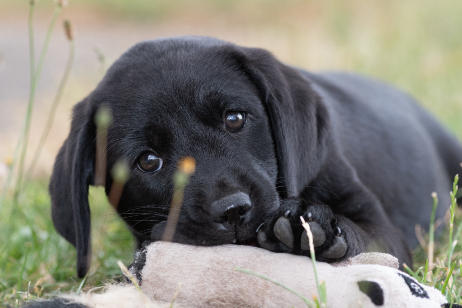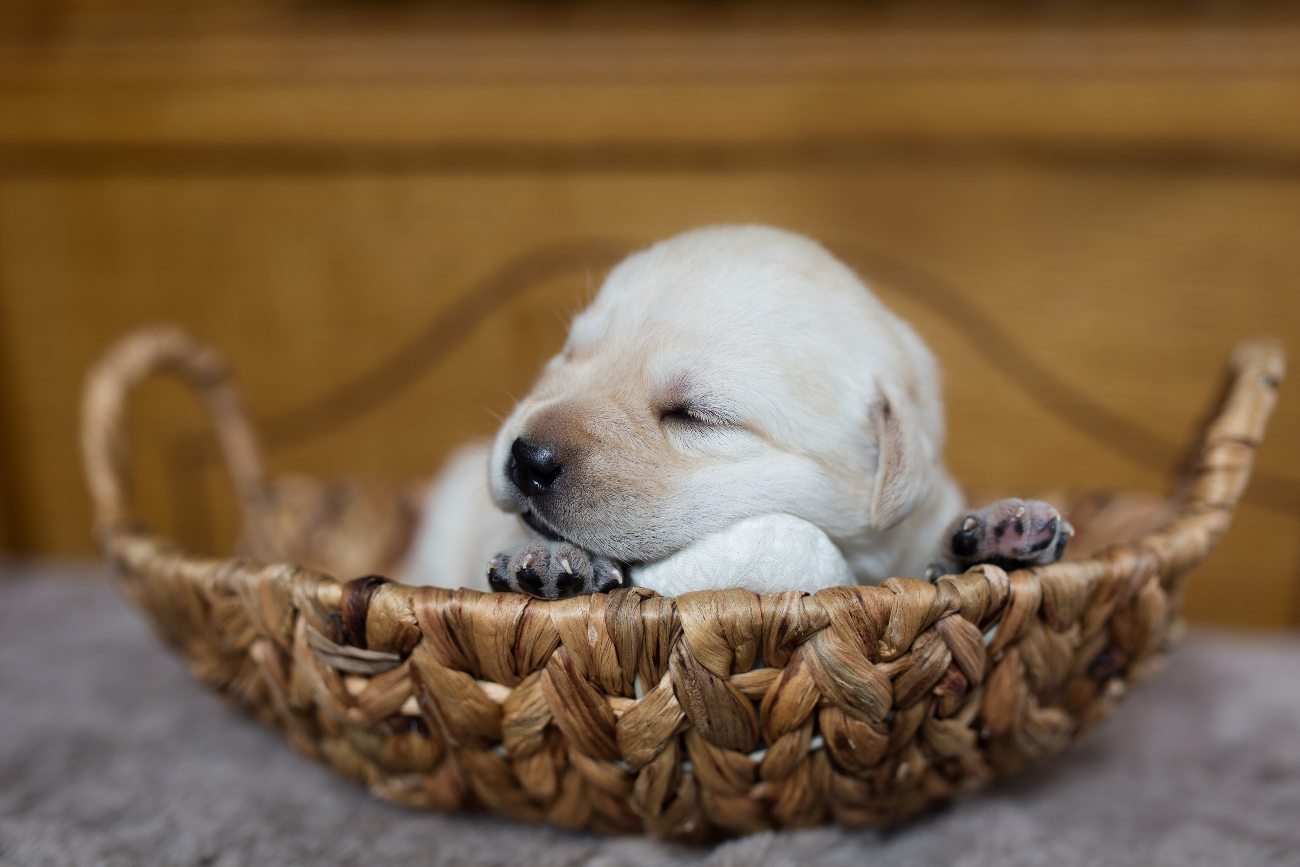Why do Labrador puppies bite so much: An in-depth analysis
31st January, 2024

When you bring home a charming little Labrador puppy, you're filled with joy. These little bundles of thick fur are renowned for their friendliness and are considered great family pets.
However, as they settle into their new homes, many owners are often left in a quandary trying to understand why do most Labrador puppies bite so much?
Understanding a Labrador Retrievers personality
Labrador Retrievers, often simply referred to as 'Labs,' are one of the most popular dog breeds in the world, and once you get to know them, it's easy to see why.
Understanding the Labrador dogs’ personality is like peeling back layers of a fascinating book - with each chapter more engaging than the last. These dogs are known for their friendly and outgoing nature. They carry an infectious joy that spreads to everyone around them.
Lab puppies are incredibly social creatures who love nothing more than spending time with their families. They're also known for their intelligence and eagerness to please, which makes them highly trainable.
Whether it's retrieving game for hunters, assisting law enforcement, or aiding those with disabilities - Lab puppies excel in any role that allows them to utilise their exceptional skills while satisfying their need for human companionship.
One of the distinctive aspects of a Labrador's personality is their undying love for playtime. Be it a game of fetch or a brisk swim, Labs are always up for engaging physical activities.
This enthusiasm is balanced by their patience and gentleness, especially around children, making them ideal family pets.
Understanding the basics
Puppies and their natural instinct to bite
Puppies, regardless of breed, have an inherent need to interact with their surroundings. Their primary tool for exploration? Their mouths!
Puppies don't have the dexterity that human hands afford, leaving them to depend heavily on their mouths to learn about their world.
Breed-specific traits amplify biting
When it comes to Labrador puppies, the biting habit is even more pronounced. As descendants of sporting breeds, Labrador Retrievers are hardwired with a strong urge to chase after prey and hold it in their mouths, making them more prone to biting.
Decoding the dog bites: Aggression or play?
The playful biting phase
Labrador puppies, known for their boundless energy, often resort to biting during puppy play.
They might growl and snarl, giving the impression of aggression, but in most cases, it's just part of their playful behaviour.
Recognising signs of aggressive biting
However, it's crucial to differentiate between playful biting and aggression.
Aggressive dog behaviour is usually accompanied by:
A hard stare
Raised hair
Tense body posture
Low growling
If your Labrador puppy displays such signs, professional help is recommended.
What triggers Lab puppies to bite?
Interaction with hands
Most puppies often associate hands with teething toys, especially when their owners wave their hands around their faces during play. This can encourage the Labrador puppy biting habit.
Interaction with children
Children, with their erratic movements and high energy levels, can overstimulate puppies, leading to excessive Lab puppy biting.
Tempting ankle bites
Ankles, being at the puppy's eye level and constantly on the move, are a tempting target for puppy biting.
Steps to curb your Labrador puppy's biting habit
Redirection: The key to mitigating biting
The primary strategy to prevent puppies from biting is redirection. Always have a chew toy at hand during playtime and redirect your puppy's attention from your hands to the chew toy when it starts to bite.
Redirection with children
Similarly, children can be taught to redirect the puppy's attention to toys during play. If the puppy starts to bite children, it's best to separate them until the puppy calms down.
Redirection with feet
If your puppy is prone to biting your feet, you can tie a flirt pole toy to your belt, which you can drag around as you walk. This will help redirect your puppy's attention to the toy instead of your feet.
Bite inhibition: The first step to stop your puppy from biting
Bite inhibition refers to a puppy's learned ability to control the force of its bite. This process is a vital part of training your Labrador puppy.
Positive interaction with toys
Encourage your puppy to interact positively with toys. This will help them understand that the fun continues as long as it keeps their sharp teeth on the toy and not on you.
Taste deterrents
If your puppy continues to bite, you can consider using taste deterrents on your hands. When your puppy bites your hand, it will get a terrible taste, discouraging them from biting again.
Training to lick instead of bite
If redirection and taste deterrents don't work, you can train your puppy to lick instead of bite.
Teaching the 'leave it' command
Training your puppy to follow the 'leave it' command can also help curb puppy biting.
Do Lab puppies grow out of biting?
As your Lab puppy grows and matures, they will eventually outgrow the biting phase. This typically happens between the ages of six and nine months.
However, this doesn't mean that the biting puppy will stop suddenly one fine day. It's a gradual process and requires consistent positive training and patience on your part.
What about when a Labrador puppy is teething?
Just like human babies, puppies also go through a teething phase which can be quite a challenging period for both the pup and its owner. This period is characterised by discomfort, restlessness, and the seemingly insatiable need to chew on everything in sight!
Your once peaceful little fur-ball might suddenly turn into a biting machine. But don't worry, this is a normal puppy behaviour which is part of their growth and development.
Puppy teething usually starts around 3-4 weeks of age when the first set of baby teeth, also known as "milk teeth", start to emerge. By the time your puppy is about 3-4 months old, these puppy teeth will fall out to make way for 42 adult teeth. During this period, your puppy may experience sore gums and may start chewing more than usual to relieve the discomfort.
So, what can you do to help? First of all, make sure you have plenty of chew toys available. These will not only save your precious belongings from being destroyed but also provide some relief for your puppy's sore gums. Additionally, feeding your pup with cold treats or freezing their chew toys can also help to alleviate the pain.
However, it is important to mention that if you are freezing your dog’s toy for an extended amount of time, it may have a negative effect on their teeth. The frozen toy may cause their teeth damage or in the worst-case scenario break them. For some more tips and tricks, check out our guide to keeping your pet’s teeth clean.
Conclusion

Understanding why Labrador puppies bite so much is the first step in managing this behaviour. With patience, consistency, and the right approach, you can successfully curb your Labrador puppy's biting habit. However, it's important to remember that puppy biting is a natural behaviour for puppies and a crucial part of puppy development.
Additional information: Looking after a Labrador puppy is a rewarding yet challenging task. A key aspect of responsible pet ownership is ensuring your puppy's health.
For a puppy insurance quote for your furry friend, you can visit our website to get a quote. If you need assistance, our puppy insurance team is available at 0330 102 5748.
Helpful Pages
Recent Posts
Pet Insurance Quote
- 98% claims paid *
- Claims paid directly to vets
- 24/7 vet video consultations
- Interest free monthly payments




